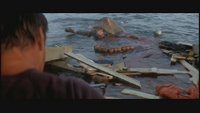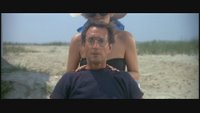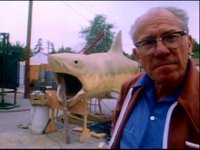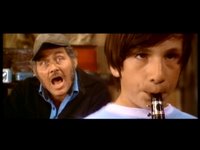Come on down and chum some of this shit
JAWS was a cultural phenomena when in was released in 1975, driving people from the beaches (and into the movie theatres to become the highest grossing movie of all time at that point) and it also made a star of its young director, Steven Spielberg, who had only made one other feature film, The Sugarland Express the year before.
JAWS is considered to be the first of what would come to be called the Summer blockbuster movie. Its success bred a template for movies in the years to come and is contributable to a number of factors: it was based on a best-selling novel and therefore had a built in core audience, it had a young eager filmmaker out to prove himself, they had cast reputable actors (such as Roy Scheider and Robert Shaw) (plus an up-and-coming actor in Richard Dreyfuss), the studio's had become much more savvy in their advertising and the story was designed in such a manner so as to speak directly to its audience at its most base, primal level: fear. The fear of the shark obviously - but also Brody's (Scheider) fear of water, which most people can empathise with, if not totally relate to (most people overcome this at an early age these days as you are tossed into the pool). The need to want to protect your family, protect your children from external forces also rings in heavily in the beach scenes. Brody's guilt over the bullshit politics of keeping the beaches open (short term tourist cash flow versus long term survival) is another nicely angled subplot. The title JAWS was used by Benchley as it was short and sweet (and fitted nicely on a dust jacket), but it is also an evocative title. As Spielberg mentions in the documentary, he saw the title and said: "What's that? What does JAWS mean?"
"There's too many captains on this island"
In truth, the JAWS novel was pulpy trash (a guaranteed best-seller) and on the face of it, was probably not very difficult to improve upon. The credited writers are the original author Peter Benchley (who cameos as an Interviewer) and Carl Gottlieb (who plays Ben the reporter), but significant contributions were also made by Howard Sackler (who is credited with "breaking the back" of the script) and John Milius (fleshing out the Indianaplois speech) and significant improvements have been made such as dropping the affair between Brody's wife (Lorraine Gary) and Hooper (Dreyfuss) and the killing of the Hooper character. Spielberg himself wrote a draft (something he did with many of his early films, CE3K another example) which I don't think he has really done since the mid-eighties. The ending is perfect and succinct, a far cry from the manipulative, sentimental and drawn out endings that have populated Spielberg's movies of late.
JAWS is generally considered a beloved film by most people (at least those who matter). I would place it along with CE3K, Raiders and ET as Spielberg's best. I know Kevin Smith considers it one of his favorite movies of all time and often refers to it - such as the scar scene in Chasing Amy (which Lethal Weapon 4 also ripped off). The USS Indianapolis scene is also oft-quoted and Spielberg considers it his favorite moment of the movie (that entire Orca sequence). Shaw made significant contributions to that speech which had been felshed out in several pages of story devised by Milius.
Technically, the movie is very well made (especially for its day and budget). Most people say "shark still looks fake" (a line riffed in Back To The Future Part Two) and of course it does, but it is only in those final moments of the movie. As Benchley quotes William Goldman: 'reality may be great and truth may be wonderful but none of it holds a candle to believability'. Up until the finale, it is kept mostly hidden (and is all the more convincing for it). It was quite a courageous thing to do at the time, make a mainstream monster movie, in which the monster was a natural predator and set a significant portion of the movie, out on the friggin water. I've always considered Verna 'Mother Cutter' Fields one of the best editors ever in the business (and this is despite the glaring continuity error with the inconsistent light as the sun rises (or not) during the opening scenes). She makes up for it with some complicated Hitchcockian type setups - such as the Kitner boy attack or the entire final sequences on the ORCA and won several awards, including an Oscar for her efforts. Bill Butler's widescreen photography nicely captures the expanse of the ocean and the placement of people in it, to either diminish or empower the characters. Much of the photography was hand-held out on the ocean and it seems incredibly complicated for a movie of that era. For example, there's a terrific down angle from Quint in the crows nest to Brody on deck below with the water surrounding them (how in the hell did they get that shot out on the water?). Spielberg also insisted to Butler that other than the blood of the victims, that there be no other red in the movie at all. The only other was the deep red of the wine that Scheider and Dreyfuss drink, which was intentional.
Which brings me to a sore point. I hate to critise some of my more beloved favorite movies, but I feel like I'm at a point where I can do it comfortably - but, I really, for the most part, don't like the music in this movie. WHAT THE HELL DID I JUST SAY? Johnny Williams? Don't say it's so? Don't get me wrong. I do love the simplicity of the ominous notes that instantly tell you when the shark is approaching. It's his equivalent to Bernard Hermann's score for Psycho, and John Carpenter would yield similar results with Halloween - all films which I'm sure wouldn't have had the same success with lesser music. It's just that for the main, I don't like the rest of the music in this movie. It's too "let's all go on a high adventure and capture a shark" fancy free type music. Which John Williams is quoted in the doco as exactly what he wanted! I would have liked the music to stay ominous throughout. Just a thought, there Johnny. What the hell do I know? He got the Oscar, the BAFTA, the Golden Globe and the freakin Grammy, not me.
"I can do anything, I'm the Chief of Police"
What the hell am I doing? I haven't even mentioned the cast yet. Spielberg wanted to use the entire cast of The Last Picture Show as it was his favorite film a the time, but instead populated the cast with reasonable newcomers, television performers and one bona fide star. Roy Schedier gives a warm performance as the twitchy Chief of Police. His biggest role up until that time was The French Connection and his career took off after JAWS with roles in films such as Marathon Man, Sorceror, Jaws 2, All That Jazz (another Oscar nomination) and Blue Thunder. Dreyfuss, a seasoned television performer, got his first big break in American Graffiti. I can only assume it was director George Lucas that introduced him to Spielberg, and would then become the director's alter ego in two other movies (Close Encounters Of The Third Kind, Always). Shaw is the true veteran of the cast. Beginning work in the early fifties, he played the villain in From Russia With Love, Henry the VIII in A Man For All Seasons, plus lead roles in The Sting and The Taking Of Pelham One Two Three prior to JAWS. He would go on to do several more movies (including another Benchley, The Deep) before passing away from a heart attack in 1978. The supporting cast is peppered with veterans and newcomers, many of which would go on to work with Spielberg in subsequent productions and many of whom appeared in the JAWS sequels: Gary (Ellen Brody), another tv veteran, would go on to roles in JAWS 2 and JAWS: The Revenge plus 1941; Murray Hamilton (Mayor Vaughn) had been working since the forties, and also appeared in both JAWS 2 and 1941; Susan Backlinie, the first shark victim, repeated her role for the opening scenes in 1941 and Jeff Kramer, the Deputy, also appeared in JAWS 2.

"Here's to swimming with bow legged women"
But I guess the real star of this movie is Spielberg. With the resouces of a major studio, an A-list cast and top of the line technical crew, he made damned sure that he got noticed. He pulled out every technical trick that he had (Hitchcock claimed at the time that he was stealing shots from him, see below) and then some, elicited natural performances from his cast and delivered on the early promise of the Duel telemovie, which shares significant thematic elements. Again, as Spielberg mentions, both films were about 'everyman' chased down by these leviathans of nature. Indeed, he used the same sound effects for the truck's death and for the shark's death. I wonder if he used these sound effects in Jurassic Park also? JAWS was the first movie to hit the $100m mark and gave Spielberg carte blanch from then on, allowing him to have terrific success with CE3K and terrific failure with 1941. It wasn't until Raiders Of The Lost Ark and E.T., The Extra-Terrestrial that Spielberg became the biggest filmmaker of his generation, eclipsing even his pal, George Lucas (who admittedly, stopped directing for twenty years. Some say he should have never come back too).

There were many issues which the production faced: due to SAG issues they had only a certain amount of time to complete the film. And no real thought had been given during the scriptwriting phase as to how they were going to do the shark. The shark was a combination of real footage (shot by Ron and Valerie Taylor) - sometimes utlising a little person, and a special effects (or 'special defects' as Spielberg put it) shark devised by Bob Mattey (the doco includes considerable silent footage of Mattey and crew at work on the 25' beast, see below). The Taylors are experienced photographing divers and their work can be seen to best effect in the documentary Blue Water, White Death.

Despite the problematic production, this movie became the template for many Summer blockbusters to come (especially those involving either natural forces of evil and/or the ocean). This (and many other stories) are essayed in Laurent Bouzerau's sterling documentary "Making of..." from the 1995 Signtaure Collection laserdisc. This laserdisc also features the standard trailers & tv spots, outtakes, deleted scenes, stills plus the soundtrack CD. Much of this was ported to the 25th Anniversary DVD, however, the documentary was reduced from it's original 2 hour running time to 1 hr. Nice one, Universal. Thankfully, they have essentially fixed their problems by reissuing everything in a 30th Anniversary DVD. The documentary has been slightly recut (?) into "A Look Inside" (110m) which has been broken up into featurettes, but has a handy dandy Play All function.
The documentary opens with Spielberg commenting that he was either more courageous or more stupid when he was younger. Well, duh, he was both. And it's that filmmaker that I miss. You still see glimpses of him, but barely. Bouzereau mostly earns his stripes, but this isn't really a documentary. It's a series of interviews well cut together, occassionally bracketed by outtakes and behind the scenes footage. But it's no Hearts Of Darkness or Under Pressure. Those films had stories to tell, which lived outside of the films they were about - this doesn't quite get to that status. The roster of intereviewees is impressive nonetheless: Benchley (who has since passed away), producers David Brown and Richard Zanuck, Gottlieb, the Taylors, Scheider, Dreyfuss, Gary, Backlinie, stuntman/actor Ted Grossman, production designer Joe Alves, an older interview with DP Butler, stuntman Richard Warlock and Williams. There are some lovely anecdotes such as the food fight instigated by Scheider and Dreyfuss,
As mentioned, the extras also include a plethora of stills and artwork, a nice little Shark Facts section, approx. 12m of deleted scenes (see below), 2m of outtakes, some storyboard comparisons and a featurette from 1975 which features Spielberg, Scheider, Dreyfuss, Gottlieb and Zanuck.


0 Comments:
Post a Comment
<< Home